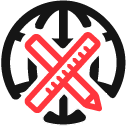In the dynamic landscape of professional growth, navigating the path to success requires more than just ambition; it also demands a well-thought-out roadmap. Strategic career planning stands as the beacon guiding aspiring professionals toward their goals. This provides a structured approach to career development and personal fulfillment.
Whether you’re a fresh graduate who’s still figuring your way into the “real world” or a professional seeking a purposeful job, you’re on the right page. Here, we will talk about the importance of making a career plan and some effective ways to ensure you’re ready to face the professional world head-on.
What is Strategic Career Planning?
Strategic career planning is a proactive process that involves setting specific goals and milestones to shape and direct one’s professional journey. It goes beyond merely landing a job and instead delves into crafting a long-term strategy that aligns with personal values, skills, and aspirations. This methodical approach requires careful consideration of one’s strengths and weaknesses, market trends, and the continual pursuit of skills and knowledge to ensure adaptability in an ever-changing professional landscape.
Unlike traditional career planning, which may focus solely on job acquisition, making a career strategy is crucial. This is because it helps you seize the chances that are in line with your objective and stay away from the doors that will lead you on a divergent path. It is a continuous process of self-evaluation, planning, honing skills, and searching for opportunities that are right for your goals.
Why is Strategic Career Planning Important?
Having a definite plan for achieving your goals in life guides you every step of the way. This is especially true when making wise decisions. Aside from that, here are more reasons strategic career planning plays a key role in turning your dreams into reality.
1. Clarity and Direction
It provides a clear and well-defined path in the often-intricate journey to career development. By outlining specific goals and milestones, strategic career planning offers individuals a sense of direction. It helps you navigate through your professional journey with purpose.
2. Goal Alignment
Strategic career planning ensures that career goals aren’t isolated but are in harmony with broader life objectives. This alignment fosters a sense of purpose, as individuals can see how professional pursuits contribute to overall life aspirations.
3. Adaptability
In a rapidly changing job market, making a career plan equips you with the skills and mindset necessary to adapt to evolving circumstances. It encourages a commitment to continuous learning and development, ensuring you remain relevant and competitive in your chosen field.
4. Proactive Decision-Making
As mentioned earlier, a career plan allows you to become a proactive decision-maker. You’re better prepared to anticipate potential challenges, capitalize on opportunities, and make informed choices that align with your long-term career vision.
5. Personal and Professional Growth
A career strategy lets you identify and leverage strengths, address weaknesses, and pursue growth opportunities. This holistic approach contributes to both personal and professional development.
6. Enhanced Job Satisfaction
Aligning one’s career path with personal values and aspirations through strategic planning enhances job satisfaction. When you feel a sense of purpose and fulfillment in your work, it positively impacts your overall well-being and happiness.
7. Efficient Resource Utilization
Strategic career planning helps you allocate your time, energy, and resources effectively. By focusing on goals that truly matter, you can optimize your efforts and make the most of available opportunities.
8. Long-Term Success
A well-structured career plan sets the stage for long-term success. It enables you to build a resilient foundation for your career, consistently learn and adapt, and position yourself for advancement and achievement.

Common Mistakes When Making a Career Plan
While creating a career plan is a crucial step toward professional success, several common mistakes can hinder its effectiveness. Being aware of these pitfalls is essential for individuals seeking to develop a robust and realistic career strategy. Here are some common mistakes when making a career plan.
1. Lack of Flexibility
Overly rigid plans may hinder adaptability. It’s crucial to allow for adjustments based on changing circumstances, industry trends, and personal growth.
2. Ignoring Personal Values
A career plan should be in harmony with one’s values. Ignoring this alignment can lead to dissatisfaction and a sense of unfulfillment, even if goals are achieved.
3. Neglecting Networking
Successful careers are often built on strong professional relationships. Failing to build connections can limit opportunities for growth and advancement.
4. Unrealistic Goals
Establishing goals that are overly ambitious or unattainable can lead to frustration and demotivation.
5. Inadequate Research
Insufficient research about your chosen industry, job market, or specific roles may lead to uninformed decisions.
Expert Tip:
Make sure to recognize and address these common mistakes early on, so you can enhance the effectiveness of your career plans. Moreover, doing so ensures a more resilient and adaptive approach to achieving your professional goals.
Tips on Developing an Effective Career Action Plan
Plotting an effective career action plan is instrumental in guiding your professional journey with purpose and intention. Here are some surefire tips to help you craft an actionable career plan.
1. Conduct a self-assessment.
Begin by identifying your strengths, weaknesses, interests, values, and skills. Understanding yourself is the foundation for setting meaningful career goals.
2. Set SMART goals.
Establish goals that are SMART (Specific, Measurable, Achievable, Relevant, and Time-bound). Clearly define what you want to achieve, how you will measure success, and set realistic deadlines for each goal.
3. Align your objectives to your values.
Ensure that your career goals align with your core values. Pursuing a career that resonates with your values contributes to a sense of fulfillment and satisfaction in your professional life.
4. Commit to lifelong learning.
Stay abreast of industry trends, advancements, and emerging technologies. Pursue relevant certifications, workshops, and training programs to enhance your skills and knowledge.
5. Cultivate a strong professional network.
Attend industry events, connect with professionals in your field, and seek mentorship. A wide network can open doors to new opportunities and provide valuable insights.
6. Seek feedback.
Regularly seek feedback from peers, mentors, and supervisors. Constructive feedback helps you identify areas for improvement and can guide your professional development.
7. Create a timeline.
Develop a timeline for achieving your career goals. Break down larger objectives into smaller, manageable steps. A timeline provides structure and helps you stay on track.

8. Be adaptable and open to change.
Since the professional world constantly evolves, so should your career plan. Make sure it’s flexible enough to accommodate shifts in your goals or industry trends.
9. Balance short-term and long-term goals.
Strike a balance between short-term achievements and long-term objectives. Ensure that your immediate actions contribute to your overarching career vision.
10. Build a personal brand.
Establish a strong personal brand. Clearly communicate your skills, accomplishments, and unique value proposition. A compelling personal brand can set you apart in a competitive job market.
11. Regularly review your career plan.
Assess your career action plan, evaluate your progress, celebrate achievements, and make adjustments as needed. A periodic review ensures your plan remains relevant and responsive to changing circumstances.
12. Expand your skill set.
Identify and acquire new skills that are in demand in your industry. This proactive approach enhances your versatility and marketability.
13. Mind your online presence.
Curate a professional online presence. Update your LinkedIn profile, showcase your achievements, and engage in industry discussions. A strong online presence can enhance your professional visibility.
14. Consider financial aspects in your career plan.
Evaluate salary expectations, benefits, and retirement planning to align your professional goals with your financial well-being.
15. Stay positive and resilient.
Maintain a positive mindset and resilience in the face of challenges. Your attitude plays a significant role in overcoming obstacles and seizing opportunities.
These tips in your career action plan can create a roadmap that not only guides your current decisions but also propels you toward sustained success and fulfillment in your professional journey.
Achieving a Successful Career
Success in one’s career is not solely measured by titles or monetary gains. A successful career is one that aligns with personal values, fosters continuous growth, and brings a sense of fulfillment. You can navigate your professional journey with purpose, resilience, and a clear vision of success. Fortunately, there are a lot of ways to achieve success. Aside from having a career plan, here’s a quick list of more ways to boost your career.
- List your career objectives.
- Carefully choose your career path.
- Know your job responsibilities.
- Be a team player and have initiative.
- Cultivate a strong work ethic.
- Maintain work-life balance.
- Find a mentor.
- Track your progress.
- Strive for growth.
- Embrace continuous learning and improve your skills.

Take a Step Closer to Success with a Fulfilling Career at FilWeb Asia
Now that you have a strategic career plan, it’s time to take the next step. Send your job applications to companies that value professional growth and their employees.
If you’re looking for one, FilWeb Asia is the right place for you. We’re not just a company of excellence, but an organization where professionals thrive. And, we want you to be part of our team. To learn more about our job opportunities, you may visit our job portal.









